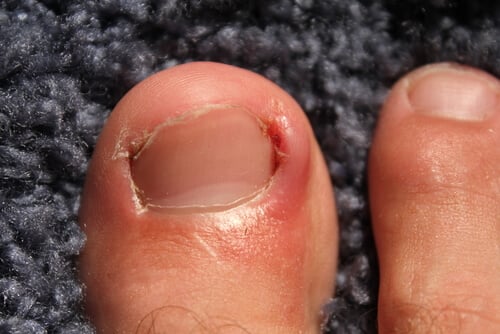Ingrown Toenail- Dubai General Surgery Clinic at DRHC Dubai
Ingrown toenails (unguis incarnatus) or Onychocryptosis is a very common problem. The etiology is still unknown. Some factors may lead to it, such as tight footwear, infection, false trimming of nails, injury, heredity, and poor nail care.
Nevertheless, the mechanism is thought to be because of curved nails that grow into the lateral nail groove and penetrate the skin (nailbed). The body will react against it as if it were a foreign body. This causes an inflammatory reaction.
The ingrowing nail may go into three stages:
- Swelling with pain.
- Inflammation with granulation tissue (induration).
- Abscess formation.
Prevention:
The most common digit that becomes affected (ingrown) is the toenail, but it can also affect any nail.
- Avoid cutting the nail straight, not as a curve, and not shorter than the flesh.
- Avoid tight footwear.
.png?width=280&height=59&name=bookanappointment%20(1).png)
Treatment depends on the severity of the cause:
- Conservative. Epsom salt in warm water, and then soak the foot for 15 minutes.
- Application of an antibiotic cream or antifungal.
- If any redness, swelling, or warm feeling occurs, consult the doctor.
Interventional Procedures:
- Brace: Straightening and lifting each side of the toenail. This causes a reduction of pressure against the skin.
- Lifting the nail: A mild inflammation (slight redness and pain without pus). The surgeon is able to lift the ingrowing nail and place a piece of cotton, which helps the nail to grow above the skin.
- Partial removal: In addition to inflammation and pain, in case of any pus discharge, a portion of the nail can be removed under local anaesthesia.
- In more severe, recurrent, or complicated cases, an extended procedure will be performed, which is the removal of the nail with underlying tissue and the base of the nail (which is the nail matrix), and a wedge excision.
Paronychia:
A nail infection, either bacterial or fungal, where the nail and skin meet at the side or base of the finger or toenail. It can start suddenly, causing an acute infection, or gradually cause a chronic infection.
Depending on the severity of the infection, a moderate infection could be treated with antibiotics with elevation of the injured finger or toe. If with pus or abscess, the area should be drained under local anaesthesia.
Panaritium:
It is an acute inflammation on the volar side of the fingers. This inflammation may extend to deeper layers. It can affect the bones, joints, and tendons, which may lead to compartment syndrome (severe pressure that may lead to insufficient blood supply of the area).
Depending on the severity, topical antifungal agents or combined with oral antifungal agents are recommended. Nevertheless, in advanced cases, surgery with drainage of the abscess may be needed.




.png?width=280&height=59&name=bookanappointment%20(1).png)
.webp?width=1080&height=1080&name=Doctor%20background%20For%20Website%20Dr.%20Fadi%20Nageeb%2009%20(1).webp)
.webp?width=1080&height=1080&name=Doctor%20background%20For%20Website%20Dr%20Abdul%20Majeed%20Khalid%20%2002%20(1).webp)



